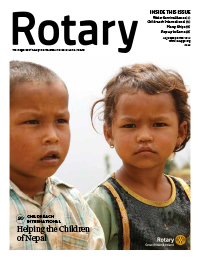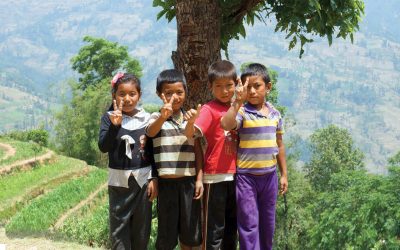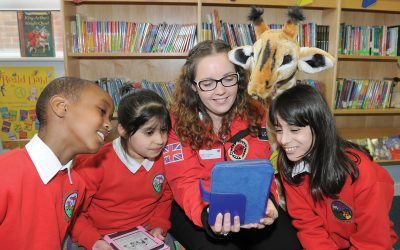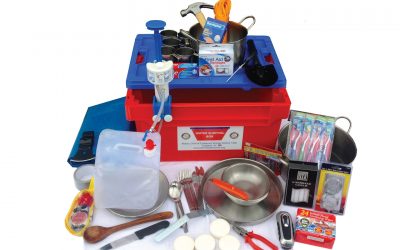Rotary Clubs across the world but especially in Great Britain and Ireland, help fund these ships. Indeed over recent years over 600 clubs have made generous donations and almost 500 clubs helped fund the international lounge on Africa Mercy such that it is named after Rotary. To highlight the work of Mercy Ships we thought two cases would be an excellent way of highlighting their work.
Barbara’s Story
Babies born with deformities in West Africa start life as victims of the superstition that abnormalities are signs of a curse. When Barbara was born with a cleft lip that extended up into her nasal cavity, her father pronounced that she was a “demon child.” He ordered his wife to take the tiny infant into the bush and leave her for dead.
Barbara’s mother, Aminata, refused to abandon her child. At eight months old, Barbara’s weight was drastically low because her cleft lip prevented her from getting the nutrition she so desperately needed. To make matters worse, she had contracted tuberculosis. Lack of financial support since the abandonment by the baby’s father was another serious obstacle.
One day Aminata met a woman who told her Barbara was not a “demon child.”
Mercy Ships would arrive in Sierra Leone in just a few weeks and volunteer surgeons onboard the Africa Mercy could fix the baby’s lip – for free! Desperately clinging to this fragment of hope, Aminata took Barbara to a Mercy Ships medical screening. Aminata was delighted when Barbara was accepted for cleft surgery onboard the Africa Mercy. However, because the baby was below the acceptable weight for surgery, she was placed on the Infant Feeding Program.
Her weight gain was intermittent and it was beginning to look like Barbara was not going to be able to have her surgery. The doctors suspected she might have a cardiac problem, too, which would interfere with plans for her surgery. At the end of three months, Barbara was cleared for surgery.
The volunteer surgeons repaired the baby’s cleft lip and palate, as well as the centreline of her nose. She was returned to intensive care where nurses monitored her recovery.
A nurse said, “Barbara is a miracle baby, she’s had a rough time but she’s made it. She’ll bring her mom a lot of joy.”
Aminata’s love and sacrificial care for Barbara was rewarded she had a strong will to survive. Barbara blesses her family with a future of beautiful smiles.
Oceane’s journey
Oceane had an encephalocele – a rare neural tube defect characterized by sac-like protrusions of neural tissue through openings in the skull. It allows cerebrospinal fluid to escape from the brain and collect in the ballooning skin on the back of her neck, forming a “second head.”
Oceane’s mother, Philomen, had brought her baby to a Mercy Ships medical screening day. Upon evaluation, surgeons planned on removing the mass and placing a small tube in her brain. The tube would drain excessive fluid from her head into her abdomen. However, the earliest surgical opening was several months away.
During the months waiting for surgery, Philomen faced challenges. As the bulge continued to swell, simple things, like bathing Oceane, began to scare Philomen. “When I gave her a bath, I never washed her head. I was scared the tumour would explode, and the baby would die.”
Philomen never lost hope that Oceane could be helped. On the due date she brought the child to the Africa Mercy. High hopes and expectations could be seen in Philomen’s eyes. Oceane was wearing a hospital ID band and sleeping on an Africa Mercy bed. This was the moment she had dreamed about for months.
Finally, the medical team decided Oceane would receive surgery and her big day was scheduled.
After the procedure a nurse walked into the ward holding a small baby with a white turban of bandages, it was Oceane, the mass was completely gone.
Philomen went to her and when she realized the mass was gone, she was speechless. For 15 minutes, she stared at her daughter, oscillating between contented smiles and joyful tears.
For the first time, Philomen could see the back of Oceane’s neck. Proudly, she tied Oceane to her back like other African mothers and walked up and down the hospital corridor. Three weeks after surgery, Oceane came to the Africa Mercy for her final post-op appointment. Smiling and laughing as she held Oceane in one arm, Philomen greeted the staff with enthusiasm, She handed Oceane to a nurse and she stared into her eyes and reached out her small hand to grab her hair. All the nurses could think was, “God has done a miracle.”
Mercy Ships continue to work miracles whenever they make port and their work will continue in Madagascar later in the year. Let’s leave the last word to a mother whose child was helped by Mercy Ships, “It has taken a long time to find a solution. I walked around to many hospitals to find help. I am very, very happy. Mercy Ships is a very good place. They take care and encourage you. Nothing bad about that.”



























































